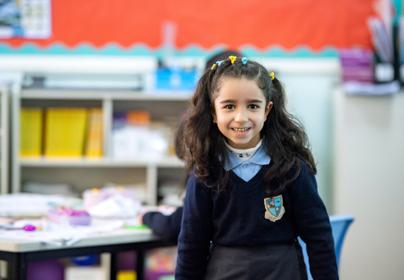In the Primary phase at Britannica, we firmly believe that a strong foundation in mathematics is essential for our students' academic and personal success. From the earliest years, we strive to instil a love of mathematics and equip our young learners with the skills and confidence to tackle increasingly complex mathematical concepts.
In Year 1, students build a strong foundation in fundamental mathematical concepts. They work on counting, understanding number values, and performing basic addition and subtraction within 20. Children also explore shapes, patterns, and measurement, learning to identify and describe various two-dimensional and three-dimensional shapes. Through hands-on activities and engaging lessons, Year 1 students develop essential mathematical skills that will serve as a springboard for more advanced topics in the years to come.
As our students progress to Year 2, they delve deeper into the world of mathematics. In our fractions unit, they learn about parts and wholes, working with equal and unequal parts, and developing an understanding of common fractional amounts like halves, quarters, and thirds. Our time unit is especially hands-on, as students practice reading time to the hour, half-hour, quarter-past, and quarter-to, laying the foundation for telling time to the nearest 5 minutes. Data analysis is the focus of our statistics unit, where students create and interpret different visual representations like tally charts, tables, block diagrams, and pictograms.
As our students enter Year 3, they continue to deepen their mathematical understanding. In the summer term, they refine their ability to tell time to the nearest minute, using both analogue and digital clocks, and solidify their grasp of the 24-hour clock and the distinction between am and pm. The Statistics unit allows students to interpret and construct simple visual representations, such as pictograms and tables, and apply their knowledge to answer real-life questions and solve problems based on the presented data.
In Year 4, students dive deeper into the world of decimal numbers, working with tenths and hundredths, and exploring the practical application of UK money. They also tackle the challenge of telling time to the exact minute and converting 12-hour analogue times to 24-hour formats. Additionally, they delve into the properties of quadrilaterals and triangles, as well as the creation and interpretation of various graphs.
At the upper end of our primary school, in Year 5, students continue to explore a range of mathematical concepts and skills. They deepen their understanding of decimals, negative numbers, and the conversion of different units of length, mass, and capacity. Throughout the term, a strong emphasis is placed on developing fluent arithmetic skills and the ability to solve multi-step word problems, applying mathematics to authentic contexts through a mastery approach to learning.
At Britannica Primary School, we firmly believe that the study of mathematics is not just about memorising formulas and procedures. It is a way of thinking, a lens through which we can make sense of the world around us.




